Welcome to our comprehensive guide on karate, a powerful martial art that encompasses both physical techniques and mental development. In this article, we will delve into the true meaning of karate and explore its many facets, from its origins and history to the benefits it offers practitioners. Whether you are a beginner or a seasoned martial artist, join us on this journey to discover the depth and richness of karate.
At its core, karate represents much more than just physical training. It is a holistic approach to personal growth, encompassing the mind, body, and spirit. Through dedicated practice, karate empowers individuals to develop discipline, self-defense techniques, and the mental fortitude needed to overcome challenges both on and off the mat.
In the following sections of this article, we will explore the true essence of karate and its impact on various aspects of life, including self-defense, personal growth, and community engagement. Let’s dive in and unlock the profound insights that karate has to offer.
Key Takeaways:
- Karate is a martial art that combines physical techniques with mental and spiritual development
- It empowers individuals through discipline and self-defense techniques
- Good karate instructors play a crucial role in personalized and effective learning experiences
- Karate training offers a wide range of physical and mental benefits
- Various styles and categories of karate exist, each with its own unique techniques and approaches
Is Karate Hard to Learn?
Many people wonder if karate is a difficult martial art to learn. While it may seem challenging at first, the perceived difficulty significantly diminishes under the guidance of a good instructor. Learning karate with a skilled teacher who understands the unique learning styles of each student can make a world of difference.
A good instructor adapts their teaching methods to suit the individual needs of each student. They provide personalized learning experiences that ensure students are consistently challenged enough to grow, without feeling overwhelmed. This approach allows students to progress at their own pace and develop a strong foundation in karate.
“A good instructor can transform the challenges of learning karate into stepping stones towards higher levels of skill and understanding.”
One of the key advantages of learning karate with a good instructor is the support and encouragement they provide. They motivate students to push past their limitations and strive for continuous improvement. Challenges are viewed as opportunities for growth, and students are guided through the learning process with patience and positive reinforcement.
Personalized learning experiences in karate also play a crucial role. By tailoring their instruction to match each student’s abilities and goals, instructors create an environment that fosters individual progress. Whether the student is a beginner or an advanced practitioner, a personalized approach ensures that they receive the guidance and feedback necessary to enhance their skills.
Learning karate is indeed a journey that requires dedication, discipline, and perseverance. However, with the right instructor, the challenges of learning karate become part of a rewarding and transformative experience. So, if you’ve ever wondered whether karate is hard to learn, remember that with a good instructor and personalized learning, it becomes an accessible and fulfilling martial art.
Stay tuned for the next section, where we explore the numerous benefits of karate training for both the mind and body.
The Benefits of Karate Training
Karate practice offers numerous physical and mental benefits, making it a well-rounded discipline for individuals of all ages. Whether you are seeking self-defense skills, personal growth, or improved physical fitness, karate provides a pathway to achieve these goals. Let’s explore some of the key advantages that karate training offers:
Physical Benefits
Engaging in regular karate practice leads to a wide range of physical improvements. The dynamic nature of karate training enhances cardiovascular endurance, strength, flexibility, and coordination. As karate involves a combination of striking, kicking, and blocking techniques, practitioners develop powerful muscles and well-developed reflexes. The practice also promotes improved balance, agility, and overall body awareness.
Karate training serves as an effective way to maintain optimal fitness levels and manage weight. The intensity of karate workouts helps individuals burn calories, increase metabolism, and develop lean muscle mass. Through consistent practice, students can achieve significant physical transformations while also enjoying the satisfaction of meeting personal fitness goals.
Mental Benefits
Beyond the physical aspects, karate offers substantial mental benefits that contribute to overall well-being. Regular practice helps develop mental discipline, focus, and concentration. As practitioners progress in their training, they gain a deep understanding of the mind-body connection, learning to synchronize their movements with their thoughts and intentions.
Moreover, karate cultivates essential life skills such as self-control, perseverance, and resilience. Through the disciplined nature of the training, practitioners learn to overcome challenges and setbacks, fostering mental fortitude and a growth mindset. These qualities extend beyond the confines of the dojo, positively impacting other areas of life, including work, relationships, and personal goals.
Karate as Self-Defense
One of the most well-known benefits of karate is its effectiveness as a self-defense system. The study of karate equips individuals with practical techniques to protect themselves in real-life situations. Karate teaches students how to assess and respond to potential threats, enabling them to confidently neutralize dangerous situations.
Key elements of karate self-defense techniques include precise striking, blocking, and evasive maneuvers. Practitioners develop a heightened sense of awareness, enhancing their ability to anticipate and react swiftly to potential danger. By learning self-defense skills through karate, individuals gain a sense of empowerment, knowing that they can safeguard themselves and others if necessary.
Karate for Personal Growth
Karate is not just a physical activity but also a means of personal growth and development. The discipline and structure of karate practice instill important values such as respect, humility, and integrity. Students learn to navigate challenges, overcome obstacles, and embrace continuous improvement.
Furthermore, karate offers a path for individuals to discover their true potential. The journey from novice to black belt requires dedication, perseverance, and commitment, fostering a sense of accomplishment and self-confidence. Along the way, students develop a strong sense of personal identity and purpose, gaining clarity about their goals and aspirations in life.
In conclusion, karate training is a transformative journey that offers a multitude of physical, mental, and personal benefits. The practice strengthens the mind and body, improves coordination and reflexes, and promotes qualities such as self-control and humility. Through karate, individuals gain self-defense skills, enhance their overall well-being, and embark on a path of personal growth and self-discovery.
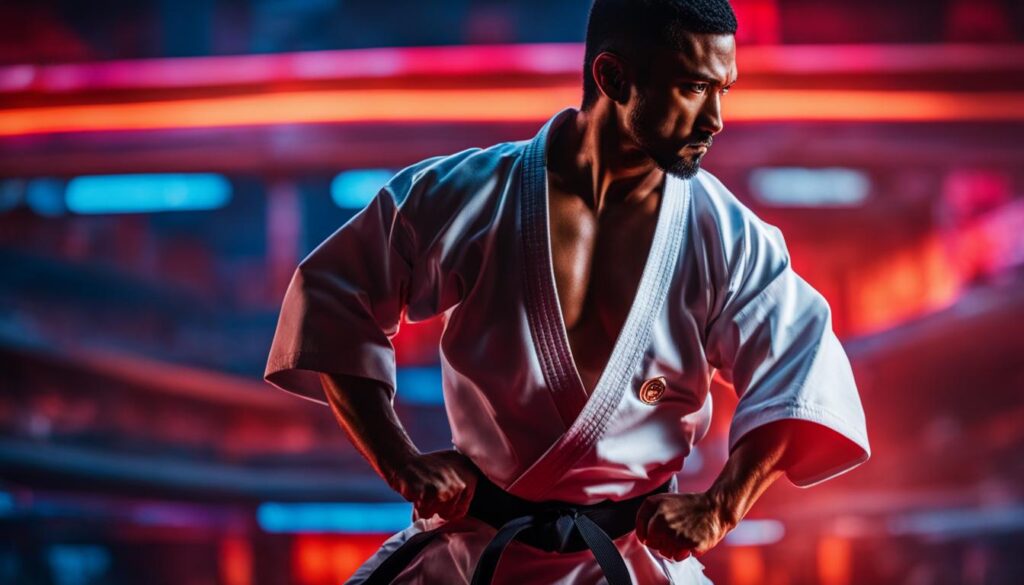
The Origins and History of Karate
Karate, a martial art with a rich and fascinating history, originated in Japan and has evolved over time, influenced by various martial arts systems. The word “karate” itself translates to “empty hand” in Japanese, highlighting the art’s focus on unarmed combat. Its roots can be traced back to ancient Okinawa, an island where it was initially developed.
https://www.youtube.com/watch?v=Ma3kzoiJ6oY
During the period when Okinawa was under the control of the Ryukyu Kingdom, trade and cultural exchanges with China and other Asian countries flourished. These interactions contributed to the development and refinement of combat techniques that would later form the foundation of karate.
As karate spread throughout Okinawa and eventually to Japan, different styles and schools emerged, each with its own unique techniques, principles, and cultural significance. Three prominent Okinawan karate masters, Gichin Funakoshi, Kenwa Mabuni, and Chojun Miyagi, are often credited with popularizing karate in mainland Japan and beyond.
Traditional karate places a strong emphasis on the integration of mind and technique, embodying the holistic approach found in Japanese martial arts. This traditional form of karate not only focuses on physical skill but also seeks to cultivate discipline, respect, and personal growth.
The history and origins of karate provide a deep cultural and historical context that enriches the practice and understanding of this martial art. Exploring the roots of karate allows practitioners to appreciate the evolution of different styles and the principles that guide its practice today.
The Three Aspects of Karate Practice
Karate practice encompasses three essential aspects that form the foundation of training: kihon (basics), kata (forms), and kumite (sparring). These aspects work harmoniously to cultivate a well-rounded karate practitioner.
Kihon:
In karate, kihon refers to the mastery of fundamental techniques and stances. It is the building block upon which all other skills are developed. Through dedicated kihon practice, students perfect their punches, kicks, blocks, strikes, and stances, ensuring precision, balance, and power in their movements.
Kata:
Kata involves performing a predetermined sequence of movements, combining various techniques, transitions, and strikes in a specific pattern. Each kata has its unique characteristics and serves as a repository of karate knowledge. Practicing kata allows students to refine their technique, timing, breathing, and focus, enhancing their overall understanding of karate.
Kumite:
Kumite provides practitioners with the opportunity to apply their techniques in controlled sparring situations. It involves both pre-arranged drills and free sparring, allowing students to develop their timing, distance, strategy, and awareness. Kumite enhances reflexes, agility, and adaptability, preparing students for real-life self-defense situations.
The three aspects of karate practice, kihon, kata, and kumite, complement and reinforce one another, ensuring a comprehensive and effective training experience. Mastery of these aspects not only hones physical skills but also cultivates mental focus, discipline, and self-confidence.
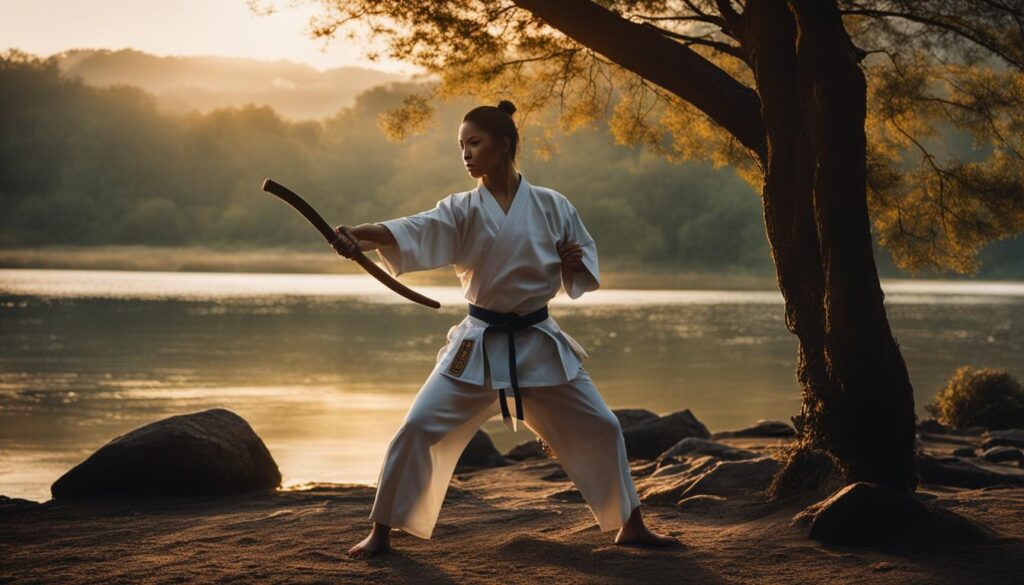
Comparison of Karate Practice Aspects
| Aspect | Focus | Benefits |
|---|---|---|
| Kihon (Basics) | Mastery of fundamental techniques and stances | – Develops precision and power – Enhances balance and coordination – Builds a strong foundation |
| Kata (Forms) | Performing predetermined sequences of movements | – Refines technique, timing, and breathing – Enhances focus and mental discipline – Deepens understanding of karate principles |
| Kumite (Sparring) | Applying techniques in controlled sparring | – Improves reflexes and agility – Develops strategic thinking and awareness – Builds self-confidence and adaptability |
The Role of a Good Karate Instructor
A good karate instructor plays a vital role in the journey of karate training. They go beyond being just a teacher; they become a mentor and guide to their students. The importance of a good karate instructor cannot be overstated, as they inspire, educate, and empower their students to reach their full potential in the martial arts.
One of the key qualities of a good karate instructor is their ability to adapt their teaching methods to suit the individual learning styles of their students. They recognize that each student is unique and requires personalized guidance to thrive. Whether a student is visual, auditory, or kinesthetic in their learning preferences, a skilled instructor can tailor their approach to ensure effective understanding and skill development.
Mentorship is a crucial aspect of karate training, and a good instructor embraces this role wholeheartedly. They take the time to understand their students’ goals, motivations, and challenges. By building a strong mentor-student relationship, they create an environment of trust and support. A skilled instructor knows how to motivate their students, push them to overcome obstacles, and celebrate their victories along the way.
A positive and supportive learning environment is paramount in karate training, and a good instructor is instrumental in creating such an atmosphere. They foster a sense of community among students, encouraging teamwork, respect, and camaraderie. Students feel comfortable asking questions, seeking guidance, and sharing their progress. This sense of belonging and support enhances the learning experience and promotes personal growth.
In conclusion, the role of a good karate instructor goes far beyond teaching techniques and forms. They inspire, mentor, and guide their students, adapting their teaching to individual learning styles and providing personalized support. A skilled instructor creates a positive and supportive learning environment that allows students to thrive. With the guidance of a good karate instructor, students can navigate the challenges of learning karate and embark on a rewarding journey of personal growth.
The Holistic Approach to Karate
Karate goes beyond physical training; it encompasses mental and spiritual development. The practice of karate strengthens the mind, develops composure, and cultivates self-confidence. It values virtues such as humility, justice, honor, and self-control. Karate is not just a martial art; it is a way of life that aims to align the mind and body and foster personal growth.
The mental and spiritual aspects of karate are essential components of the practice. Through dedicated training, practitioners develop mental fortitude, discipline, and focus. The mind becomes more resilient, allowing individuals to overcome challenges not only in karate but also in their daily lives.
The mind-body connection is a cornerstone of karate philosophy. By honing their physical techniques, practitioners are simultaneously training their mind and strengthening their spirit. The power of the mind becomes evident as techniques are executed with precision and intent.
The mind is like water. When it is calm, everything becomes clear. – Gichin Funakoshi
The mental and spiritual development in karate is achieved through various training methods. Meditation and mindfulness practices help practitioners cultivate focus and self-awareness. Breathing exercises promote relaxation and concentration. The study of kata, or forms, deepens understanding and instills discipline.
Karate as a way of life extends beyond the dojo walls. It encourages practitioners to apply the principles they learn on the training floor to every aspect of their lives. The values of karate, such as respect, honesty, perseverance, and self-control, guide practitioners in their interactions with others and in facing life’s challenges.
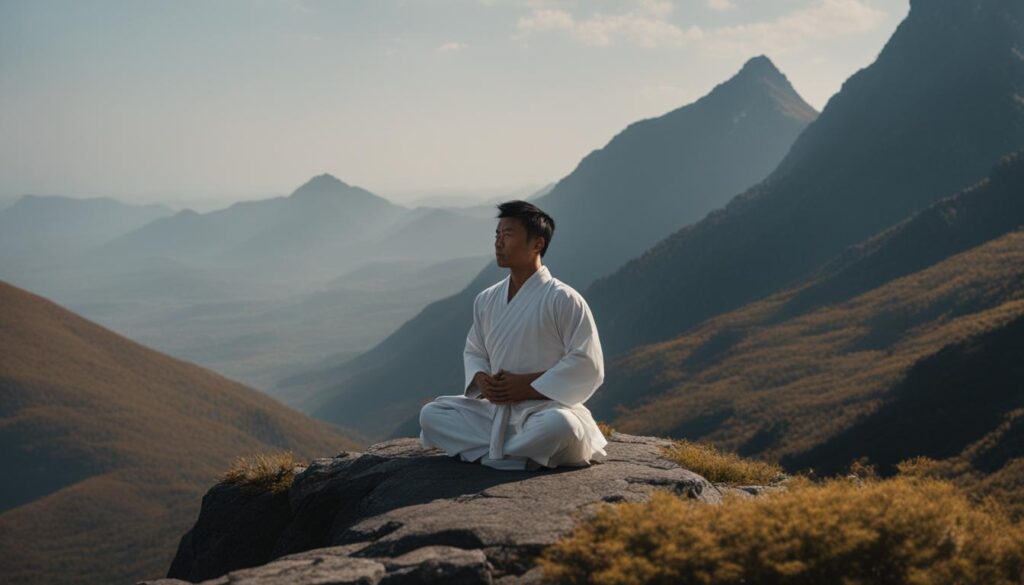
The mind and body are interconnected, and karate offers a path to harmonize and strengthen both. As the mind becomes more focused, the body becomes stronger, more agile, and more efficient in executing techniques. The mind-body connection is a source of power and balance that enables karate practitioners to rise above physical limitations and achieve their full potential.
By embracing the holistic approach to karate, individuals can experience personal growth, increased self-confidence, and a deeper sense of purpose. Karate becomes more than just a martial art; it becomes a way of life that encompasses physical, mental, and spiritual development.
Karate as a Means of Self-Defense
Karate is not only a martial art, but also an effective means of self-defense. Through karate training, individuals learn techniques for protecting themselves in threatening situations, empowering them with the knowledge and skills necessary to defend against potential harm.
Self-defense in karate involves a variety of techniques that can be used to neutralize and subdue attackers. These techniques include:
- Blocks: Defensive movements used to intercept and redirect attacks.
- Strikes: Offensive movements aimed at incapacitating the opponent.
- Evasions: Quick footwork and body movements to avoid incoming attacks.
- Throws: Techniques used to off-balance and immobilize opponents.
- Joint manipulations: Techniques that involve manipulating an opponent’s joints to cause pain or restrict their movement.
By practicing these techniques under the guidance of a qualified karate instructor, individuals develop the skills and confidence needed to effectively defend themselves if necessary. Regular training in self-defense techniques enhances situational awareness, reflexes, and the ability to respond effectively in dangerous situations.
The Sense of Community in Karate
Karate is not just an individual pursuit; it fosters a sense of community. Joining a karate class means becoming part of a supportive environment where fellow students and instructors provide encouragement and motivation. The camaraderie within the karate community plays a vital role in making the learning process enjoyable and less daunting.
The karate community is a diverse group of individuals with a shared passion for martial arts. In karate classes, students work together to improve their skills, support one another through challenges, and celebrate each other’s achievements. This supportive environment creates a sense of belonging and makes the journey of learning karate more fulfilling.
When training in karate, you become part of a team that cheers you on during your successes and helps you overcome obstacles. The camaraderie built within karate classes fosters a positive and encouraging atmosphere, where students can push their limits and grow both physically and mentally.
In a supportive karate community, instructors play a crucial role in nurturing camaraderie. They create a safe space for students to express themselves, ask questions, and seek guidance. These instructors not only teach the technical aspects of karate but also serve as mentors, imparting wisdom, and inspiring their students to reach their full potential.
Whether you are a beginner or an experienced karate practitioner, the karate community welcomes you. It provides a platform where you can connect with like-minded individuals, form lasting friendships, and build a network of support. The bonds formed within the karate community go beyond the dojo, extending to various aspects of life.
Being part of a karate community offers numerous benefits, such as accountability, camaraderie, and a shared passion for martial arts. It creates an atmosphere of mutual respect and collaboration, where everyone is encouraged to grow and succeed. Together, the karate community embarks on a journey of self-improvement, inspiring and challenging one another along the way.
So, if you’re looking to be a part of a supportive and uplifting environment, join the karate community. Experience the bond, friendship, and camaraderie that make karate classes not just a training session, but a transformative experience.
Karate Training for Personal Growth
Karate training goes beyond physical exercise; it is a journey of personal growth and self-improvement. The practice of karate instills discipline and perseverance, which are qualities that extend far beyond the confines of the dojo. As students face challenges and overcome obstacles in their karate classes, they develop mental fortitude, resilience, and the ability to conquer difficulties not only in karate but also in other areas of life.
The discipline required in karate classes translates into a disciplined mindset that can be applied to various aspects of life. By consistently showing up to train, students develop a strong work ethic and a commitment to excellence. This commitment to continuous improvement creates a mindset of self-improvement that extends beyond the dojo walls.
In addition to discipline, karate fosters other valuable qualities that contribute to personal growth. As students strive to master techniques and advance in rank, they learn the importance of goal-setting, patience, and perseverance. The challenges faced in karate training provide an opportunity for self-reflection and self-discovery, promoting self-awareness and personal development.
Moreover, karate training cultivates mental fortitude, teaching practitioners to keep calm and focused even in stressful situations. This mental resilience extends beyond physical confrontations, empowering individuals to face life’s challenges with composure and confidence.
By immersing oneself in the practice of karate, individuals not only improve their physical fitness and self-defense skills but also embark on a transformative journey of self-discovery and personal growth. The discipline, perseverance, and mental fortitude fostered in karate permeate other areas of life, allowing individuals to confront challenges head-on, reach their full potential, and lead a more fulfilling and empowered life.
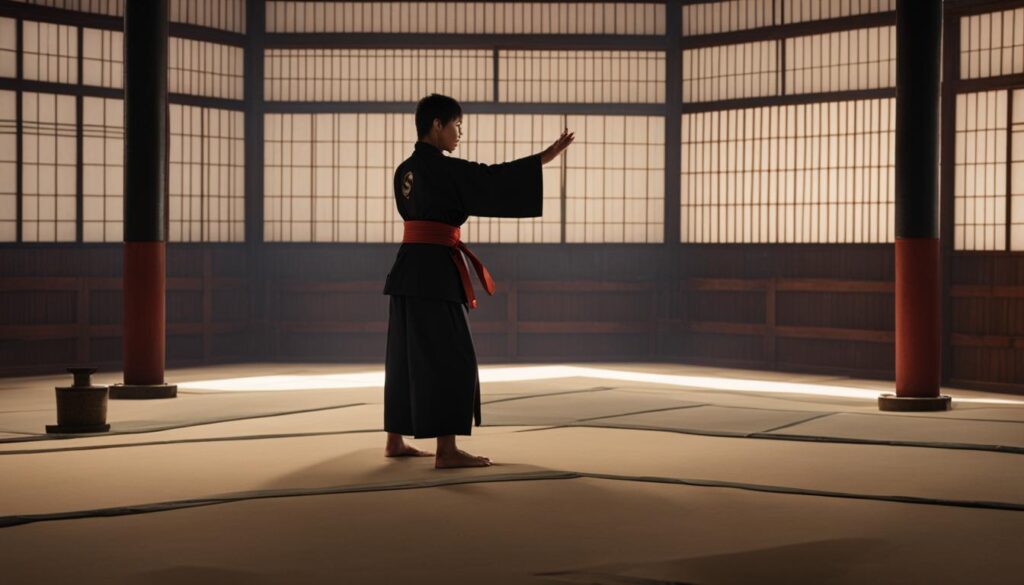
The Philosophy of Karate
The philosophy of karate centers around the integration of mind and technique. In the practice of karate, the mind becomes the focal point, guiding the physical movements and actions. The mind’s intention is manifested through the execution of precise and controlled techniques, giving each movement purpose and meaning.
The process of refining karate techniques goes beyond merely perfecting physical movements. It involves polishing one’s own spirit or mentality, striving to become a strong individual both on and off the training mat. Karate practitioners cultivate virtues such as humility, calmness, and the ability to express themselves sincerely.
In the philosophy of karate, mental focus plays a crucial role. By maintaining a focused mind, practitioners can channel their energy and concentration towards the desired outcome. This level of mental focus enhances the effectiveness of techniques and enables practitioners to respond quickly and appropriately in different situations.
Furthermore, karate emphasizes the mind-body connection. The integration of mind and technique allows practitioners to harmonize their mental and physical states, achieving a state of flow. This connection enhances overall performance and enables practitioners to execute techniques with power, precision, and efficiency.
The philosophy of karate extends beyond the physical aspects of the martial art. It encompasses personal growth and self-improvement, encouraging individuals to lead balanced lives and embody the principles of karate in their daily interactions.
Through the philosophy of karate, practitioners develop not only their physical abilities but also their mental fortitude and character. The holistic approach of karate makes it a transformative journey that nurtures individuals to become resilient, focused, and humble, both inside and outside the dojo.
The Physical and Mental Benefits of Karate
Karate practice offers a range of physical and mental benefits that contribute to overall well-being. Whether you are a beginner or an experienced practitioner, engaging in karate can strengthen your mind and body, leading to a healthier and more fulfilling life.
Physically, karate training involves dynamic movements that work the entire body. It improves coordination, reflexes, and stamina. Through a combination of strikes, kicks, and blocks, karate stimulates cardiovascular endurance and muscular strength. Regular practice also enhances flexibility, agility, and balance.
Beyond the physical aspect, karate develops important mental skills that positively impact daily life. The practice requires discipline and focus, cultivating qualities such as composure, clarity of thought, and the ability to stay centered even in stressful situations. Through training, individuals gain insight into their mental capabilities and learn to overcome obstacles with perseverance and resilience.
Moreover, karate fosters self-confidence by instilling a sense of accomplishment and self-belief. As practitioners progress in their training, they build a solid foundation of skills and techniques, which boosts their self-esteem and empowers them to face challenges both on and off the mat.
The physical and mental aspects of karate are interconnected, each one supporting and reinforcing the other. Regular practice not only improves physical fitness but also enhances mental well-being, leading to a more balanced and harmonious lifestyle.
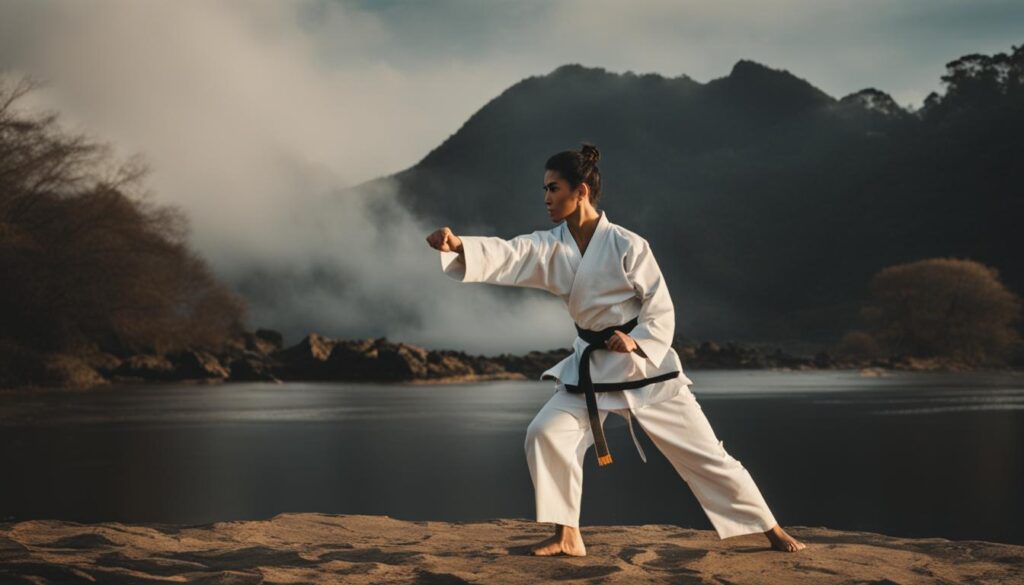
Different Styles and Categories of Karate
Karate is a vast martial art that encompasses various styles and categories rooted in different regions and cultures. Each style has its own unique techniques, principles, and cultural backgrounds, making karate a diverse and rich discipline. Let us explore some of the prominent karate styles and categories from around the world:
Japanese Karate Styles
In Japan, karate has a long history and has given rise to several influential styles. Some of the most well-known Japanese karate styles are:
- Shotokan: Founded by Gichin Funakoshi, Shotokan is characterized by its focus on strong stances, dynamic movements, and powerful strikes.
- Goju-Ryu: Developed by Chojun Miyagi, Goju-Ryu emphasizes a combination of hard and soft techniques, incorporating circular motions and breathing exercises.
- Wado-Ryu: Founded by Hironori Otsuka, Wado-Ryu incorporates elements of Jujutsu and focuses on evasion, redirection, and fluid movements.
Korean Karate
Korean martial arts have also made significant contributions to the world of karate. Two prominent Korean karate styles are:
- Taekwondo: Known for its dynamic kicks and acrobatic movements, Taekwondo emphasizes speed, flexibility, and competition.
- Hapkido: Hapkido is a versatile martial art that utilizes joint locks, throws, and strikes, making it effective for self-defense in close-quarters combat.
Chinese Karate
China has a rich tradition of martial arts, and karate has been influenced by Chinese systems as well. Some notable Chinese karate styles are:
- Tai Chi: Known for its slow and flowing movements, Tai Chi is often practiced for health benefits, stress reduction, and meditation.
- Kung Fu: Kung Fu encompasses a wide range of Chinese martial arts styles, characterized by their diverse techniques, forms, and philosophies.
Brazilian Martial Arts
Brazil is famous for its vibrant martial arts scene, and two Brazilian disciplines have gained international recognition:
- Capoeira: Capoeira is a unique blend of martial arts, dance, and music. It incorporates acrobatic movements, fluid kicks, and rhythmic patterns.
- Brazilian Jiu-Jitsu: Known for its ground fighting and submission techniques, Brazilian Jiu-Jitsu focuses on leverage and technique, allowing smaller individuals to overcome larger opponents.
Reality-Based Self-Defense
In addition to traditional karate styles, there are also reality-based self-defense systems that prioritize practical techniques for real-world situations. One example of such a system is:
- Krav Maga: Developed for military and law enforcement personnel, Krav Maga incorporates elements of striking, grappling, and defensive tactics to neutralize threats efficiently.
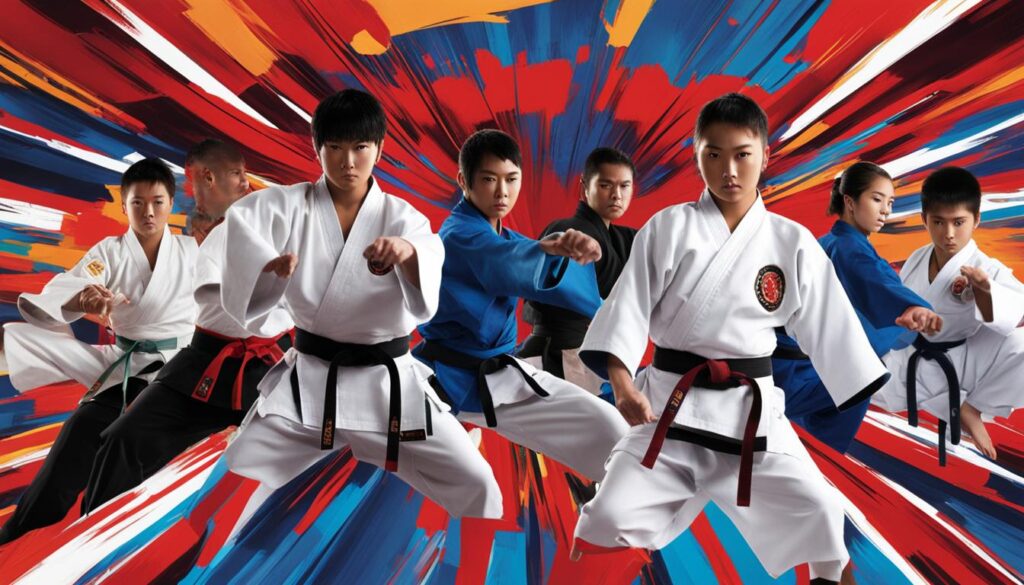
These are just a few examples of the many karate styles and categories that exist worldwide. Each style brings its unique flavor and philosophy to the practice of karate, ensuring a diverse and vibrant martial art.
Conclusion
Karate is not just a martial art; it is a rewarding journey of self-discovery and personal growth. Through karate practice, individuals can experience transformation in every aspect of their lives. Physically, karate offers immense benefits, improving coordination, reflexes, and overall health. Mentally, it cultivates composure, clarity of thought, and self-confidence. With the integration of mind and technique, karate becomes a holistic way of life, promoting spiritual and mental development.
One of the key advantages of karate is its focus on self-defense skills. By learning the techniques and principles of karate, individuals can develop the ability to protect themselves in challenging situations. Moreover, karate practice fosters a sense of community, as students and instructors provide support and guidance to one another. The camaraderie within the karate community creates a positive and supportive learning environment, making the journey even more enjoyable.
Embarking on the path of karate is a commitment to personal growth. With the guidance of a skilled instructor and the support of a nurturing environment, the challenges of learning karate transform into stepping stones towards higher levels of skill and understanding. Karate becomes a powerful tool for self-improvement, instilling discipline, resilience, and the ability to overcome obstacles not only on the training mat but in all aspects of life. Start your karate journey today and unlock the rewards it has to offer!
FAQ
What does karate mean?
Karate is a Japanese martial art that translates to “empty hand” in English, emphasizing its focus on unarmed combat.
Is karate hard to learn?
Learning karate can be challenging, but with the guidance of a good instructor and personalized learning experiences, it can be more approachable and rewarding.
What are the benefits of karate training?
Karate training offers physical benefits such as improved coordination, reflexes, and overall health. It also promotes personal growth, self-improvement, and self-defense skills.
What is the history of karate?
Karate originated in Japan and has evolved over time through various martial arts systems. Traditional karate is deeply rooted in Japanese martial arts history.
What are the aspects of karate practice?
Karate practice consists of three aspects: kihon (basics), kata (forms), and kumite (sparring), which work together to develop well-rounded skills.
What role does a good karate instructor play?
A good karate instructor is not just a teacher but also a mentor and guide. They adapt their teaching to individual learning styles and create a positive and supportive learning environment.
How does karate promote holistic development?
Karate goes beyond physical training and encompasses mental and spiritual development. It cultivates qualities such as humility, justice, honor, and self-control.
How is karate useful for self-defense?
Karate equips individuals with techniques for self-defense, including blocks, strikes, evasions, throws, and joint manipulations, empowering them to protect themselves in threatening situations.
What is the sense of community like in karate?
Joining a karate class means becoming part of a supportive community where fellow students and instructors provide encouragement and motivation throughout the learning process.
How does karate training contribute to personal growth?
Karate training promotes discipline, perseverance, and mental fortitude, which are qualities that extend beyond the dojo and contribute to personal growth in various aspects of life.
What is the philosophy behind karate?
The philosophy of karate emphasizes the integration of mind and technique, with karate practitioners striving to become strong individuals who embody humility, calmness, and sincerity.
What are the physical and mental benefits of karate?
Karate strengthens the entire body, improves coordination, reflexes, and stamina. Mentally, it develops composure, clarity of thought, insight into one’s capabilities, and self-confidence.
What are the different styles and categories of karate?
Karate encompasses various styles and categories influenced by different regions and cultures, including Japanese karate styles like Shotokan, Korean karate styles like Taekwondo, and Chinese karate styles like Tai Chi.
What makes karate a rewarding journey?
Karate offers a rewarding journey of self-discovery and personal growth. It empowers individuals through discipline, self-improvement, and the cultivation of physical, mental, and spiritual well-being.
